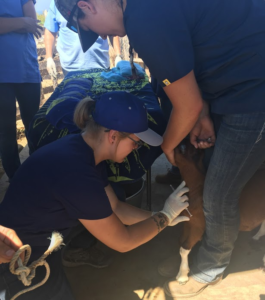Lea esta historia en español aquí
Aptly named VACA, which is Spanish for “cow,” a new bilingual and bi-cultural livestock veterinary course debuted at the CSU Todos Santos Center in Baja California Sur Mexico in July.
Veterinary Action for Consulting in the Americas (VACA) explores veterinary skills associated with ranch consulting on livestock health and management, while incorporating language and culture courses into the curriculum.
Eight students from six veterinary schools in the United States and Mexico participated in the course, which was led by livestock faculty member Dr. Katie Simpson from Colorado State University, Dr. Jose Erales Villamil from the Universidad Autonoma de Yucatan (UADY), the state university of Yucatan in Mexico, and Dr. Elia Alvarez Ramos from the CSU Todos Santos Center.
The course covered cattle production in both countries, basic health and reproductive management, nutrition and husbandry of cattle, zoonotic diseases, and how to work with ranchers to achieve their goals.
Students say the deeper impact was working with colleagues to effectively communicate across languages and understand the cultural differences in raising animals in various parts of the world. They learned from the faculty and from each other, thanks to their varying backgrounds.
“The VACA program was unlike anything I’ve experienced before and was truly an unforgettable experience that I’ll carry with me long throughout my career. It taught me the importance of cross-cultural communication and collaboration and offered experience in evaluating and consulting in livestock operations, while respecting cultural differences and breaking down barriers,” said April Regas, a second-year CSU veterinary student.
Hands-on in the field
The students and instructors visited two ranches that collaborate with CSU Todos Santos, and whose main purpose is to raise calves. The students evaluated all aspects of management on the ranch, and researched ways to increase production. “We approached two real scenarios that we can face tomorrow as veterinarians, it was an experience that made me grow a lot… we all did our best to give the proposals to the ranchers and improve their production,” said Guillermo Pantoja, a student from UADY.

“This experience was hands on in every way, from learning and speaking Spanish while in classes with fellow Mexican veterinary students to visiting ranches and performing hands on veterinary care, as well as giving recommendations to the ranchers,” Regas said. “This is my first experience since entering vet school that I felt like I was offering an expert opinion and was being taken seriously. While it was a unique environment in which to do that, I will use the knowledge and experience that I had throughout my career as a veterinarian.”
Washington State University veterinary student Danielle Petrini found the international teamwork to be especially valuable. “Collaborating with a team of veterinarians and students from both Mexico and the United States was the most important and effective aspect of the VACA curriculum. I will enter the livestock industry as a veterinarian prepared to navigate cultural differences by utilizing my understanding and appreciation of medicine and production in Mexico.”
Renata Echeverria, a veterinary student from Baja California Sur, appreciated the theoretical and practical aspects of the course: “I had the opportunity to live together with other people and to know the culture from another country, this opens a whole new world of opportunities.”
“It was a wonderful sight, to see how quickly the students bonded and formed into a team with a true desire to understand the specific challenges each rancher was facing. Working with these amazing ranchers, students, and instructors in this way was an awesome, unique, and synergistic experience for all of us!” said Simpson.
Far-reaching impact
Dr. Danielle Frey, the college’s director of international student experiences, credits Western rancher Wells Bekins for his support of this innovative cultural exchange. “Wells’ dedication to providing opportunities for veterinary students dedicated to livestock medicine fueled the creation of this course. We wouldn’t have this experience without him.”
This kind of international exchange gives students a foundation in communicating with ranchers and with Spanish-speaking animal caregivers,” she said. “We can improve food safety along the food chain by communicating with people who care directly for the animals. This course will have waves of magnitude we don’t even know about yet. It really epitomizes what the whole Todos Santos campus is about – students from Mexico and the U.S. learning side by side.”
VACA is one of 10 CSU-sponsored international and outreach programs, aimed at providing additional experiential learning opportunities for veterinary students outside of the hospital and classroom. For more information on participating as a CSU veterinary student or sponsoring these opportunities for a CSU veterinary student, contact Danielle Frey, director of international student experiences.